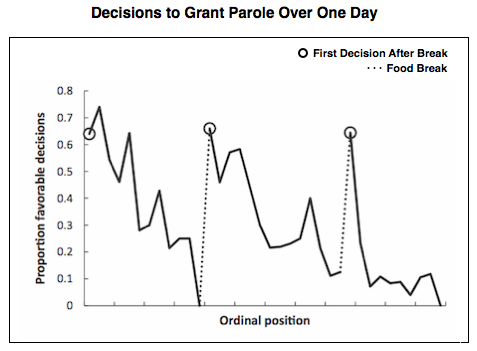Depletion and parole
It turns out that being tired isn't just detrimental to exam performance. One theory in decision making that we are beginning to understand better, Depletion Theory, holds that our ability to make any type of difficult decisions are also adversely affected by fatigue. In most of our day to day lives, being tired at the end of a long work day doesn't lead to too many terrible decisions, maybe a candy bar here or there, or fast food when we should go for a healthy wrap. However, sometimes the effects are more significant.
Consider the dramatic results of a recent study by Shai Danziger, Jonathan Levav, and Liora Avnim-Pesso, investigating a large set of parole rulings of judges in Israeli courts. Their conclusion is striking. Judges systematically tend to grant parole when they are most refreshed: at the beginning of the day. After that their decisions change and the likelihood of granting parole drops as the number of decisions they make goes up. But the effect is not the same across the whole day — after their lunch break they get some extra energy that rejuvenates them and their decisions look much more like the ones they have made early in the day
It seems that the cognitive burden of making these difficult moral decisions builds such that over time it is easier and easier to simply accept the conservative, status quo decision not to grant parole.








Dan Ariely's Blog
- Dan Ariely's profile
- 3914 followers




